Lily Kepner, Austin American-Statesman
Wed, May 15, 2024
About 7:30 a.m. Tuesday, a small group of University of Texas students, staff and community members gathered in front of the warmly lit UT Tower. Unlike many other recent gatherings on campus, the group wasn't carrying signs, it wasn't chanting, and those in attendance weren't all from the same organizations.
But they were all set on the same mission: to march to the Texas Capitol ahead of the long-awaited 9 a.m. Senate Higher Education Subcommittee hearing on Senate Bill 17, antisemitism on college campuses and free speech, to express to lawmakers their experiences with what's happening at their institutions.
"It’s being used in ways that I think even the legislators didn’t expect,” Anne Lewis, a UT professor who was at the Tower with the Texas State Employees Union's executive board, said about SB 17, a bill that went into effect in January and banned diversity, equity and inclusion offices and initiatives at all Texas public universities and colleges.
“On the ground here, of course, they don't see what happens when they enforce these things," Lewis added.
More than 200 people signed up to give public testimony at the Senate subcommittee hearing, and 148 people did. The majority spoke about SB 17's consequences, but many also discussed their concern with the massive police response to the pro-Palestinian protests held at UT over the past few weeks and their worries over free speech.
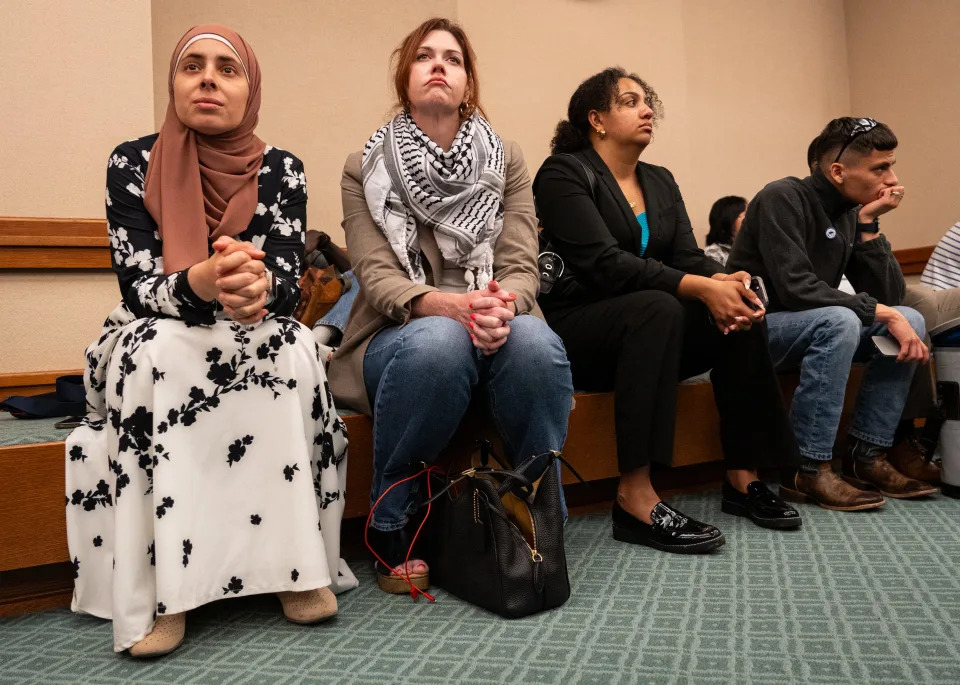
From left, Aman Odeh, Jessica and Gracie I. in the overflow room Tuesday to watch the Texas Senate Higher Education Subcommittee discuss campus free speech and the implementation of the Senate Bill 17 ban on diversity initiatives.
The testimony was a stark difference from the subcommittee's agenda — which included invited panelists, including a Jewish UT student and a representative from the Anti-Defamation League, both of whom spoke about how the pro-Palestinian protests had antisemitic qualities and were threatening to Jewish students, and university chancellors who affirmed their full commitment to enforcing SB 17.
In his opening remarks and in a statement sent after the hearing, Sen. Brandon Creighton, R-Conroe, who authored SB 17 and chairs the subcommittee, connected the pro-Palestinian protests — which in part called on universities to divest from Israeli weapons manufacturers — to the activism seen across the country in the summer of 2020 after George Floyd, a Black man who was murdered by a white cop in Philadelphia, when demonstrators advocated for more equity and improvements to DEI resources on campus. He said Texas would not stand to be told what to do.
"The rise of DEI and the actions of outside agitators are both examples of small groups of individuals who believe they can control Texas higher education and force institutions to bend to their demands," Creighton said. "But we will not tolerate this in Texas."
Creighton also said he supports equality and a merit-based system in higher education and that he is "encouraged" by creative programs that reach "students that reflect the diversity of our state."
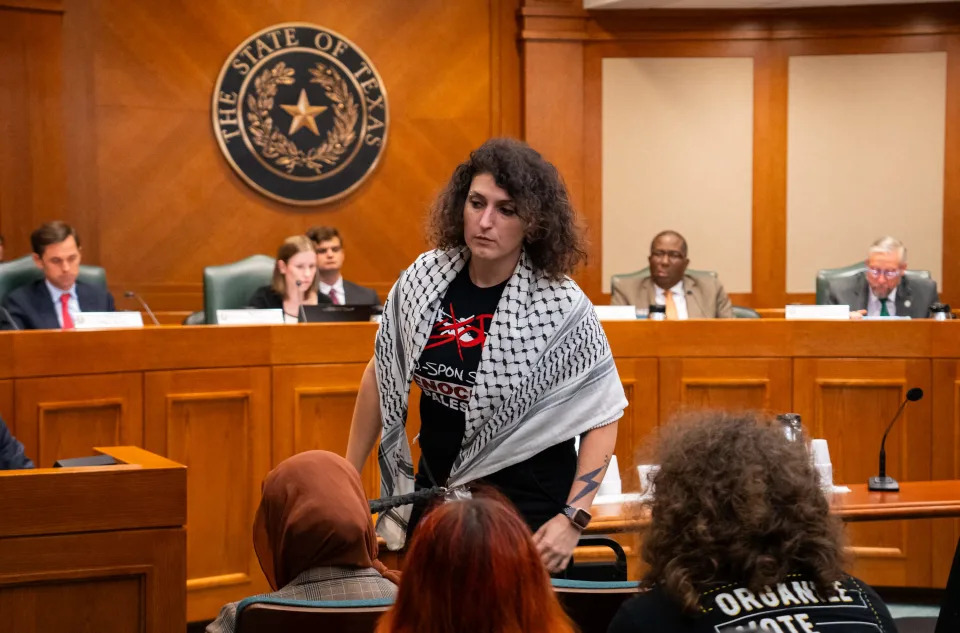
Hanna Barakat leaves the lectern after speaking during the public comment section of Tuesday's Senate Higher Education Subcommittee meeting.
Texas university students, staff testify to Senate panel on SB 17?
Several UT staff members who had complied with SB 17 — but had formerly worked in DEI positions and suddenly lost their jobs April 2 — also gave public testimony of their losses to the subcommittee, as did several people who were arrested at the UT protests, some crying and explaining how difficult it was to return to campus.
One person, who spoke in the last hour of the 11-hour hearing, asked Creighton why no Palestinian or Pro-Palestinian person involved in the protests was invited to speak at the earlier panel about campus free speech. The subcommittee was not required to answer questions from those participating in the public comment portion of the hearing, and Creighton did not respond to the speaker.
"There was no representation from those who have really been impacted by these anti-free speech movements, which really has been the Palestinian community and their allies on campus," said Noor Saleh, a UT Law School student and a member of the new group Parents for Peace, who did not testify but attended the hearing and spoke to the American-Statesman. She said the panel felt "one-sided," which felt "irresponsible."
Saleh said it is devastating to hear about antisemitism at the protests, but she said it does not reflect the broader movement. At UT, she said, organizers "have been very clear that we do not endorse, nor do we support any sort of antisemitic behavior."
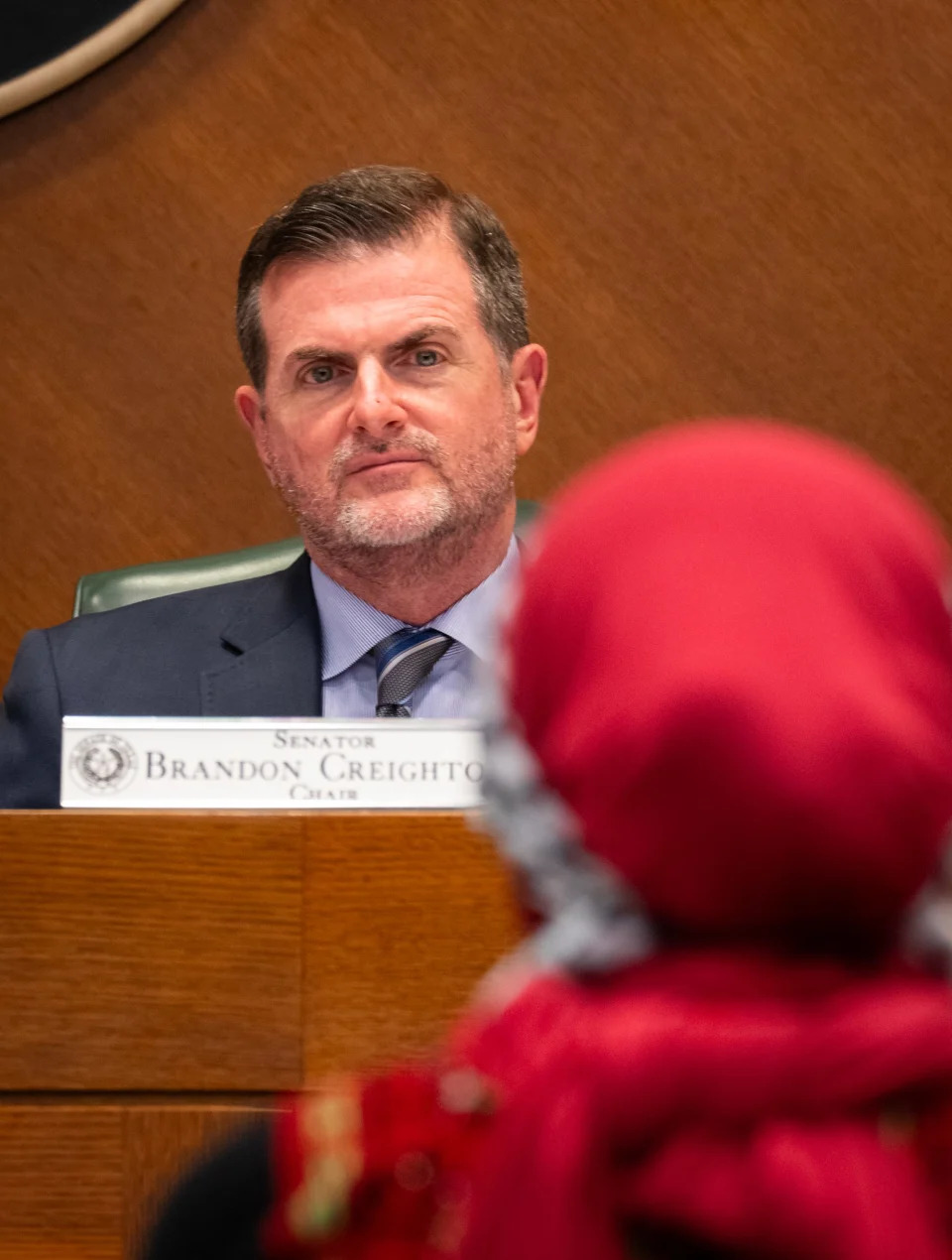
Sen. Brandon Creighton, R-Conroe, the author of SB 17, listens to speakers Tuesday. Creighton said, "The rise of DEI and the actions of outside agitators are both examples of small groups of individuals who believe they can control Texas higher education and force institutions to bend to their demands."
Several Jewish individuals who are supportive of the protests also testified about the "weaponization" of antisemitism to suppress anti-Israel speech.
Sam Law, a UT graduate student, said in his testimony that he has not faced antisemitism at the protests. He said one of the most impactful moments for him over the past month was attending a Shabbat service on the South Lawn with Palestinian, Muslim, Christian and Jewish students praying for the people in Gaza, where more than 34,000 people have been reportedly killed as Israel continues bombarding the region in response to a deadly Oct. 7 attack on the Jewish state by Hamas, a militant Palestinian group.
Many students, professors, staff members and alums spoke about how SB 17 has been used in ways the law did not intend, such as affecting their ability to get grants or student support programs at UT like the Monarch Program, which helped immigrant students and those without documentation as well as confusing the grant application process for professors.
"Everything we told y'all we were scared of has happened," said Izabella de la Garza, a UT alum involved in Texas Students for DEI who testified against SB 17 at the Legislature last year when she was a senior.
Alicia Moreno, a UT staff member and UT alum who was laid off April 2, called on lawmakers to further clarify SB 17 to prevent overcompliance by universities and the unnecessary closing of programs, like those at UT.
"The bill has caused our students to feel unwanted and unsupported," Moreno said in her written testimony. "It has taken away our centers, programs, and necessary critical services."
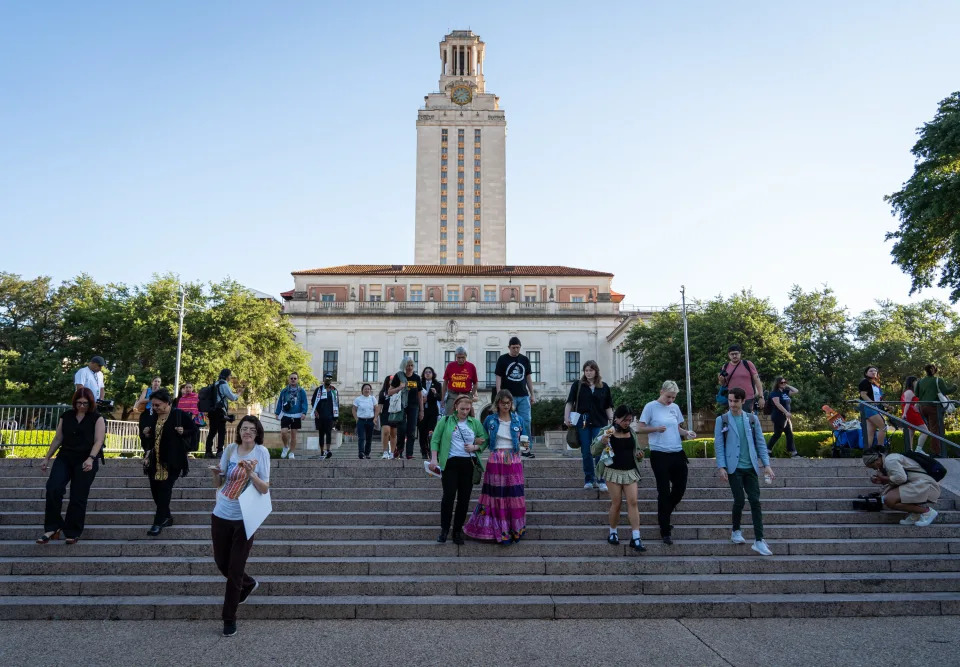
Members of the UT campus community, including students, faculty and alumni, begin a march Tuesday from the UT Tower to the Capitol to attend the Texas Senate Higher Education Subcommittee hearing on campus free speech and SB 17.
How will SB 17 testimony be considered?
Creighton thanked everyone who spoke for their testimony and said the hearing "will lay the groundwork" for the next legislative session, set to begin in January. He expressed gratitude that he is able to hear from everyone, and other committee members thanked him for holding the hearing.
But Maria Unda and Jenna Doane, both of whom have doctorates in education policy from UT and marched from the Tower to the Capitol and stayed all day to testify about SB 17's far-reaching effects, said they don't know if the subcommittee will listen.
Unda and Doane have studied diversity within UT, and said they believe SB 17 will hurt recruitment and graduation rates. Doane also said there is a connection between SB 17 and the reaction to the protests in its impact on free speech.
"I think a lot of this centers around the suppression of freedom of speech, of academic freedom," Doane told the Statesman. "Now, faculty, staff are extremely afraid to share just about anything that they might get reported or fired for."
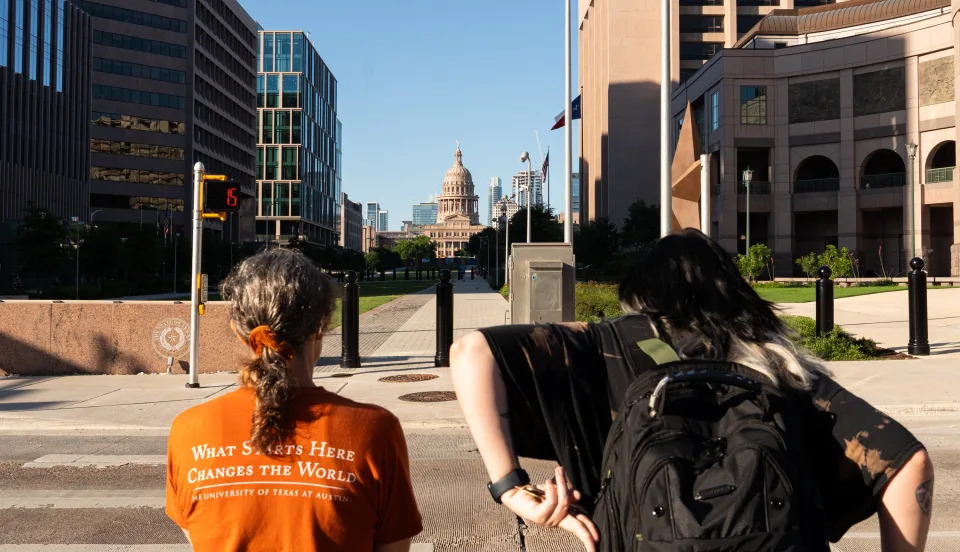
People march from the UT campus to the Capitol to attend Tuesday's hearing.
Unda said her hope is that grassroots organizing will give power to student voices and bring awareness to what's going on.
Kamyia Gibbs, who just finished her fourth year at UT, drove from Houston to the Capitol for the hearing. She said she wished the lawmakers had asked more questions of the students to help improve SB 17.
Sandra Isiguzo, who just graduated in neuroscience from UT, said she thinks the hearing date being held after UT's commencement ceremony, made it more difficult for people to testify.
"At the student level, (SB 17) is just a mess," Isiguzo said. "Because this bill is so vague that people are just closing things and not supporting students because they don't want to get in trouble."
Isiguzo attended Black Graduation, a UT cultural graduation that previously was funded by the university but now is paid for with money raised by students due to SB 17, which she said was incredibly emotional.
"The messaging is that they don't want us here," Isiguzo said.
Saleh said she went to law school to connect marginalized communities to lawmakers. Yesterday, she said, the significant public testimony felt like an embodiment of that goal.
"To see that happen yesterday was incredible," Saleh said, adding that she wants lawmakers to know that students will not stop advocating and organizing for what they believe in.
This article originally appeared on Austin American-Statesman: Texas anti-DEI law draws testimony from people fearful of SB 17 effect
Texas Senate panel holds hearing on DEI, antisemitism. What UT chancellor said of protests
Lily Kepner, Austin American-Statesman
Updated Wed, May 15, 2024
University of Texas System Chancellor J.B. Milliken said elements of the pro-Palestinian protests over the past few weeks at UT were antisemitic in response to a question from the Texas Senate Higher Education Subcommittee, citing testimony from a Jewish UT student who spoke to the panel of his experience.
The subcommittee on Tuesday held hearings with university system chancellors over their institutions' compliance with Senate Bill 17, a state law that went into effect in January and bans public universities from having diversity, equity and inclusion offices or related functions, and the hearing also focused on antisemitism on campuses and free speech policies born from Senate Bill 18, a 2019 law that made public universities' outdoor spaces traditional public forums.
Outside of the chancellors and counsels, the committee had three invited panelists — a UT student, a UT professor specializing in the First Amendment and the policy director of the Anti-Defamation League — with the student and league speakers discussing increasing antisemitism and fear affecting Jewish students due to recent pro-Palestinian protests on college campuses. No pro-Palestinian representatives were included in the subcommittee's agenda.
Sen. Brandon Creighton, R-Conroe, the author of SB 17 and the subcommittee's chairman, asked Milliken and Texas A&M System Chancellor John Sharp, "If you both recognize, especially what happened on the UT campus and across the country, that these were anti-Jewish protests in their very nature?" referring to the pro-Palestinian demonstrations on campuses.
Milliken affirmed that elements of the protests were antisemitic, and said he'd agree that they were anti-Jewish.
“Not everybody involved is an antisemite and as you heard from the law professor, we value free speech, political speech, all of that," Milliken said. "It's when it crosses a line with threats, intimidation — creating an environment where students cannot pursue their education.”
Sharp said the protests at Texas A&M campuses have been less intense, but that he has no tolerance for antisemitism.
The protests at UT called on the university and the UT System to divest from Israeli weapons manufacturers. More than 130 people were arrested over two protests at UT — the first on April 24 and another on April 29 when demonstrators set up a surprise encampment that was quickly dismantled by police.
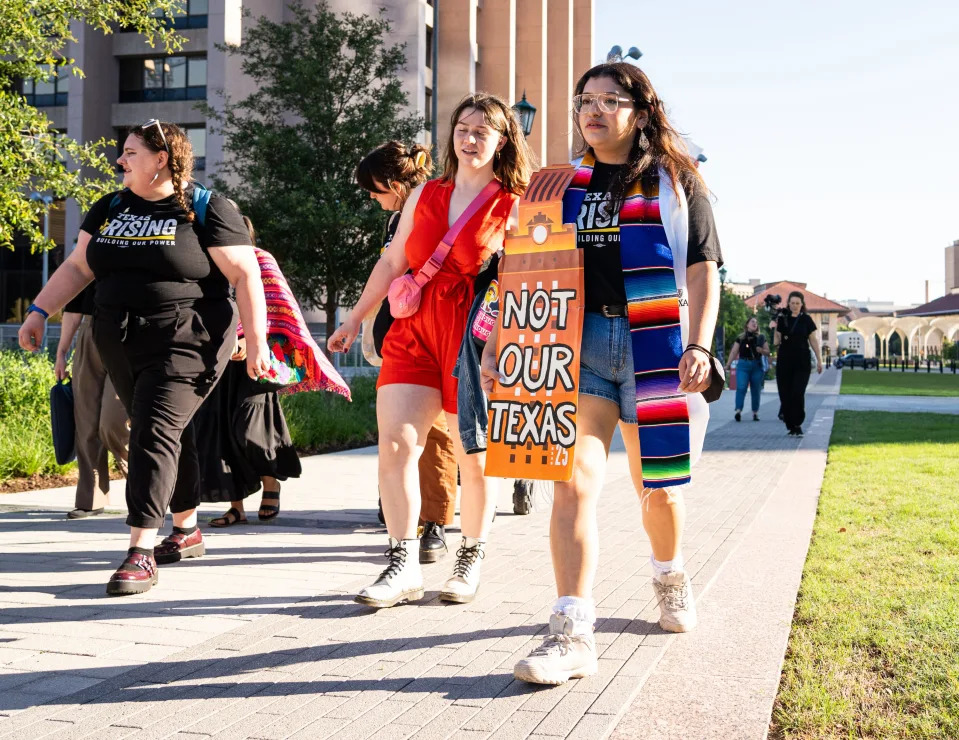
University of Texas graduate Jackie Compos, right, marches with others from the UT campus to the Capitol ahead of a Texas Senate Higher Education Subcommittee hearing Tuesday on campus free speech and Senate Bill 17, the bill banning diversity initiatives in Texas public colleges.
Antisemitism and campus free speech
UT sophomore Levi Fox testified to the panel about his experience with antisemitism on campus, including an encounter with a UT professor he said had approached him and verbally harassed him with an antisemitic threat.
"People ask how the Holocaust happened," Fox said. "Auschwitz wasn't built overnight. It was built as Jew hatred gradually became accepted and when society was desensitized to hate."
Fox said he knows people who have hidden their Judaism or are afraid of being seen going into Jewish spaces for fear of being targeted.
Courtney Toretto from the Anti-Defamation League said this year has had the greatest number of antisemitic incident reports since the group started collecting data decades ago. Toretto also spoke about the impact of chants like "From the river to the sea" and the "intifada," which she said call for the destruction of Jewish people in Israel.
"Many Jewish students report feeling isolated and targeted by these protests. While ADL vehemently supports the right to free speech and peaceful protest, we draw the line when conduct on campus crosses the line into harassment that threatens public safety and (students') well-being," Toretto said.
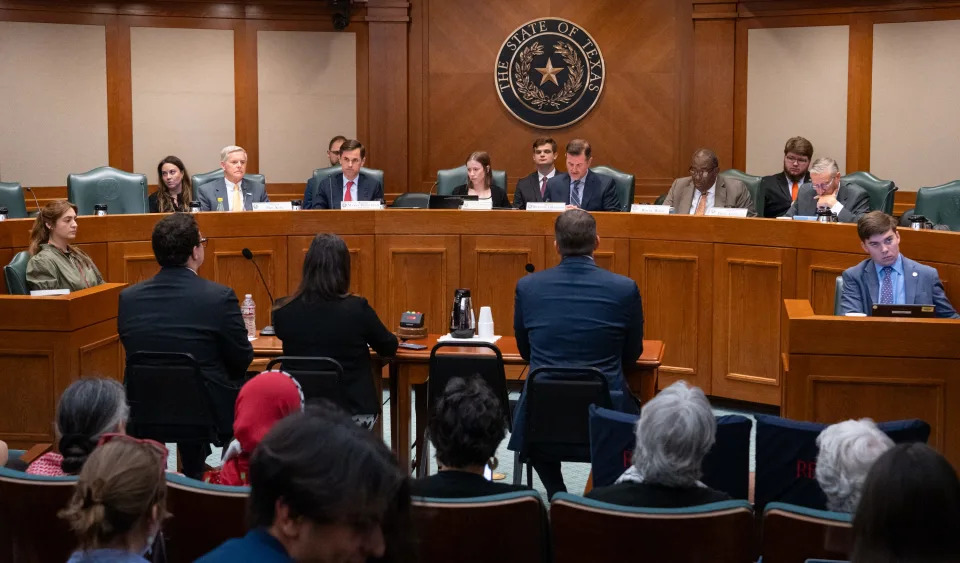
The Texas Senate Higher Education Subcommittee hears from UT student Levi Fox, center left, Anti-Defamation League Policy Director Courtney Toretto and First Amendment lawyer Steven T. Collis.
Fox told the American-Statesman after his testimony to the subcommittee that he is a staunch believer in free speech, and he hopes the Legislature guards free speech and protects Jewish students by encouraging more Holocaust education in schools. Asked when protests crossed the line, he said when there is violence and intimidation.
"There is no category of speech in United States law known as hate speech," Steven Collis, director of the Bech-Loughlin First Amendment Center and a professor at UT's Law School, told the subcommittee. But speech that incites violence or raises a "reasonable fear of imminent bodily harm" can be limited, he said.
Public universities are allowed to set reasonable restrictions and rules for protesting as long as they are implemented in a content-neutral way, he said.
"They try to conflate antisemitism with a student's right to protest and to free speech, which is wrong in and of itself," Rep. Ron Reynolds, D-Missouri City, told the Statesman after the Texas Legislative Black Caucus, which he chairs, held a news conference Tuesday over SB 17 and the right to protest.
Islamophobia was not mentioned as part of the subcommittee's agenda or at the panel. During the public testimony portion of the meeting Tuesday some speakers asked for there to be "equal protection of free speech."
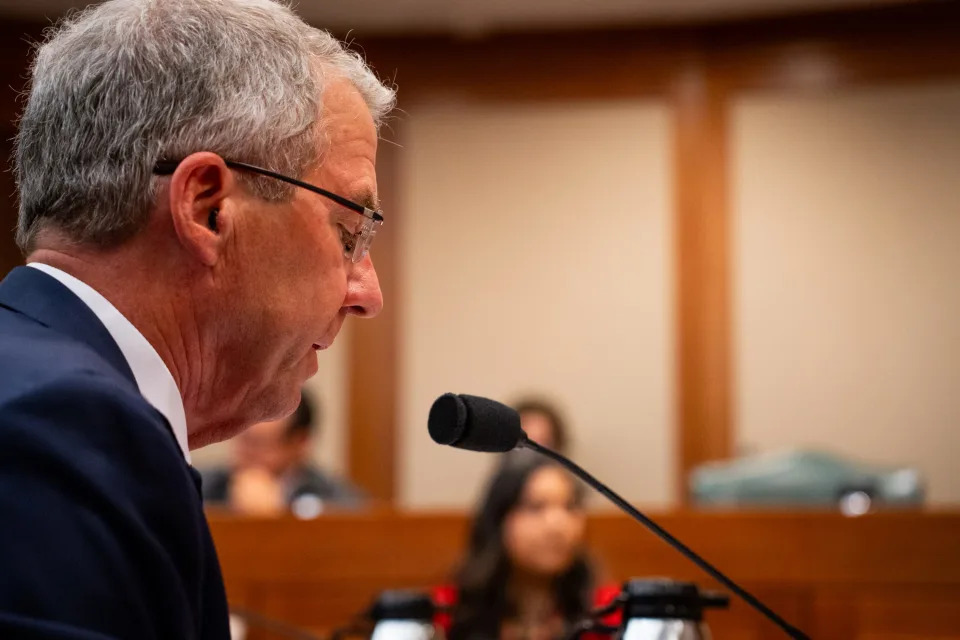
UT System Chancellor J.B. Milliken said at Tuesday's hearing that he believed the pro-Palestinian protests at UT had been antisemitic.
SB 17 compliance, difficulties and successes
Milliken and Sharp asserted their commitments to following SB 17 exactly as written. But UT System's general counsel, Daniel Sharphorn, told the subcommittee that the system has struggled with the law's effects on grants.
"We've struggled mightily with how to handle the grants," Sharphorn said. "Part of it is talking to the granting agency to know what laws we're dealing with. ... Right now, I don't know that we've learned enough to know what the impact is going to be."
Brooks Moore, Texas A&M System's general counsel, said he thinks the accreditor's language is broad enough that he is not worried.
Milliken said the system has reallocated about $25 million that was previously used toward DEI, according to what the institutions have reported. The system closed 21 offices, eliminated 311 full- and part-time positions, and cut about 681 contracts, programs and trainings, Milliken said.
The 311 eliminated positions include the 49 former DEI staff positions that UT President Jay Hartzell cut April 2 as part of a reorganization after SB 17 that included the closing of the adapted Division of Campus and Community Engagement, a UT System spokesperson confirmed.
Also in April, four months after the compliance deadline, UT-Dallas announced that it would close a new office created to comply with SB 17 and eliminate about 20 staff positions that had been adapted.
Creighton said there's compliance as written, and then there's compliance "beyond the four corners of the document." He said UT seemed to take a "holistic approach," including finding other duplicative efforts and inefficiencies and making changes, and he asked how it came to those conclusions.
"Our board made a pretty strong statement about this last fall, that this is the law of the land, that we will fully commit to implement every element of it," Milliken said.
Sharp said the Texas A&M System had fewer DEI resources to start with, and only eight positions across the system had been eliminated, not including student positions.
Both systems asserted their ability to audit their institutions by this summer and work with state auditors.
Milliken initially said that all systems have worked together to ensure uniform compliance, but differences later emerged. In response to a question from Sen. Royce West, D-Dallas, Sharp said that Texas A&M has not changed its financial support of student groups because it is exempt from the law. At UT-Austin, sponsored student groups who had been under the now-closed Multicultural Engagement Center lost their university funding due to SB 17.
Milliken said the sponsored groups were different because they had their own university spaces and other privileges, and they are now registered organizations, which do not receive university funding.
West also asked if there is a reporting process for eliminated programs that people feel are overcompliant with the law. Milliken said the power to reinstate any programs would fall to the presidents of the institutions.
Creighton, Milliken and Sharp also stated their commitment to helping ensure access to all. Milliken pointed to the Promise Plus endowment at the UT-Rio Grande Valley campus, which covers all tuition for students whose families makes a combined income of less than $100,000.
Gary Bledsoe, president of the Texas Chapter of the NAACP, spoke at the news conference the Texas Legislative Black Caucus and other organizations held at the same time as the hearing. In an interview with the Statesman, he said DEI is intended to help all, and the absence of it has created a "hostile" environment at UT.
"If you think somebody's not included in DEI, change the definition and the scope and keep the existing people," Bledsoe said. "That shows again that it's a lie."
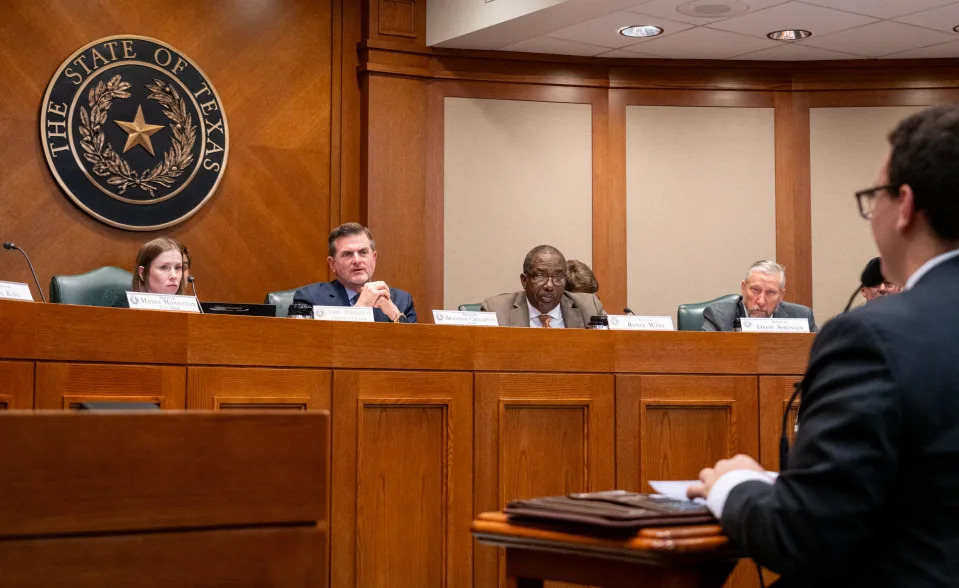
UT student Levi Fox answers questions from Sen. Brandon Creighton during the hearing. Fox said he had experienced antisemitism on campus.
Editor's note: This story has been updated with an additional quote from Milliken adding more context to his statements about the antisemitic elements of the pro-Palestine protests at UT.
This article originally appeared on Austin American-Statesman: How Texas is following anti-DEI compliance, free speech at colleges
UT System shuts down 21 DEI offices and cuts hundreds of positions to comply with law
Jala Washington
KZAN
Tue, May 14, 2024 at 10:30 AM MDT·3 min read
AUSTIN (KXAN) — On Tuesday, Texas senators reviewed progress to make sure public universities and colleges throughout the state are in compliance with Senate Bill 17, a law that requires Texas public universities to disband Diversity, Equity and Inclusion offices by 2024.
Groups monitor for compliance, overreach of new Texas anti-DEI law
According to a meeting agenda, the Senate Subcommittee on Higher Education began meeting at 9 a.m. to consider a few topics, including the monitoring of the DEI law.
State Senator Brandon Creigton opened the DEI discussion, a leading advocate to implement to ban of such practices in higher education. Creighton feels DEI practices did more to divide campuses, which is why he drafted legislation to end it.
Full Interview: State Senator Brandon Creighton talks DEI ban
“These ultimatums escalated, creating significant riffs on campus, targeting anyone who disagreed and many changes were demanded aiming to reshape the university into an institution focused on social justice and equality of outcome,” Creigton said. “This was when DEI bureaucracies grew out of control, replacing merit with equity for some.”
The senate received updates from both UT System Chancellor James B. Milliken and Texas A&M System Chancellor, John Sharp.
Milliken testified UT’s 14 institutions completed internal audits, which led to shutting down 21 DEI offices, getting rid of 311 positions and canceling 681 contracts. Milliken said the UT System reallocated over $25 million.
“I think through the audit process…we may in fact, learn that we haven’t addressed everything,” Milliken said.
Sharp testified Texas A&M system changes to comply with SB17, were less drastic as it was less involved in DEI efforts before the new law went into effect.
Ahead of the meeting, a group of protesters walked to the Texas State Capitol. Texas Rising, a project of the Texas Freedom Network that supports social justice work and young people of color, organized the walk.
UT employees linked to DEI to lose their jobs
Members from Texas Rising, TXS4DEI, Texas AFT, the Legal Defense Fund, and other youth advocacy organizations will testify in opposition to SB 17’s implementation.
“SB 17 was passed during the 2023 legislative session and prevents public colleges and universities in Texas from having diversity, equity, and inclusion (DEI) offices or policies. Since going into effect, campuses across Texas have laid off employees and closed departments potentially affected by the bill, with the University of Texas in Austin laying off 49 employees in April and UT Dallas completely shutting down the campus DEI office, laying off around 20 employees.
Tue, May 14, 2024 at 10:30 AM MDT·3 min read
AUSTIN (KXAN) — On Tuesday, Texas senators reviewed progress to make sure public universities and colleges throughout the state are in compliance with Senate Bill 17, a law that requires Texas public universities to disband Diversity, Equity and Inclusion offices by 2024.
Groups monitor for compliance, overreach of new Texas anti-DEI law
According to a meeting agenda, the Senate Subcommittee on Higher Education began meeting at 9 a.m. to consider a few topics, including the monitoring of the DEI law.
State Senator Brandon Creigton opened the DEI discussion, a leading advocate to implement to ban of such practices in higher education. Creighton feels DEI practices did more to divide campuses, which is why he drafted legislation to end it.
Full Interview: State Senator Brandon Creighton talks DEI ban
“These ultimatums escalated, creating significant riffs on campus, targeting anyone who disagreed and many changes were demanded aiming to reshape the university into an institution focused on social justice and equality of outcome,” Creigton said. “This was when DEI bureaucracies grew out of control, replacing merit with equity for some.”
The senate received updates from both UT System Chancellor James B. Milliken and Texas A&M System Chancellor, John Sharp.
Milliken testified UT’s 14 institutions completed internal audits, which led to shutting down 21 DEI offices, getting rid of 311 positions and canceling 681 contracts. Milliken said the UT System reallocated over $25 million.
“I think through the audit process…we may in fact, learn that we haven’t addressed everything,” Milliken said.
Sharp testified Texas A&M system changes to comply with SB17, were less drastic as it was less involved in DEI efforts before the new law went into effect.
Ahead of the meeting, a group of protesters walked to the Texas State Capitol. Texas Rising, a project of the Texas Freedom Network that supports social justice work and young people of color, organized the walk.
UT employees linked to DEI to lose their jobs
Members from Texas Rising, TXS4DEI, Texas AFT, the Legal Defense Fund, and other youth advocacy organizations will testify in opposition to SB 17’s implementation.
“SB 17 was passed during the 2023 legislative session and prevents public colleges and universities in Texas from having diversity, equity, and inclusion (DEI) offices or policies. Since going into effect, campuses across Texas have laid off employees and closed departments potentially affected by the bill, with the University of Texas in Austin laying off 49 employees in April and UT Dallas completely shutting down the campus DEI office, laying off around 20 employees.
Texas Rising
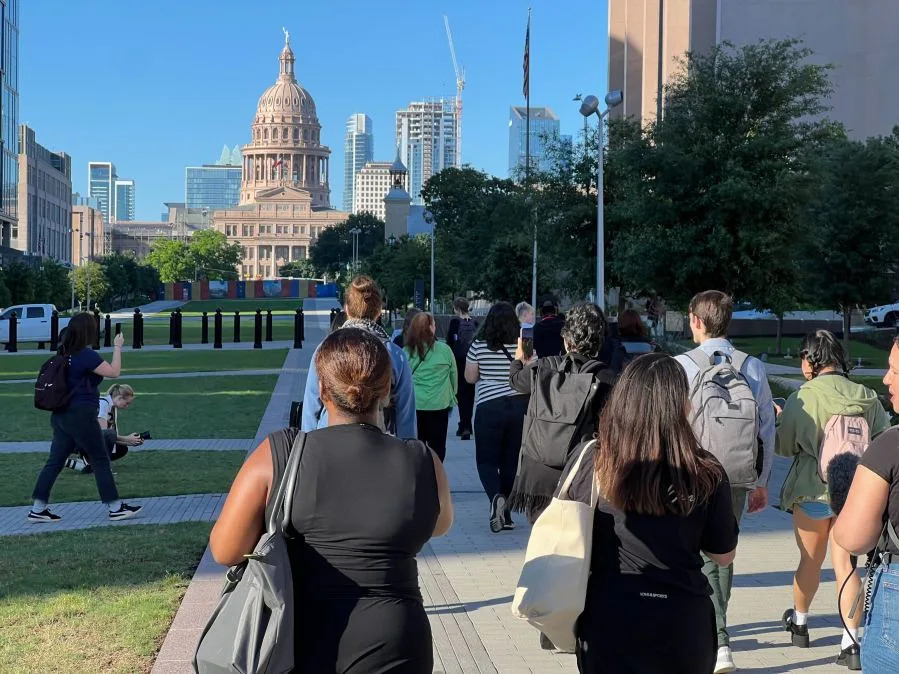
DEI Rally, march to the Capitol building Tuesday, May 14, 2024
(KXAN photo/Todd Bailey)
The Texas Legislative Black Caucus, the Texas State Conference of the American Association of University Professors and the Texas State Conference of NAACP Branches, the League of United Latin American Citizens, and the Mexican American Legislative Caucus, along with other partner organizations, students and staff will also hold a press conference speaking out against the DEI law on Tuesday.
The Texas Legislative Black Caucus, the Texas State Conference of the American Association of University Professors and the Texas State Conference of NAACP Branches, the League of United Latin American Citizens, and the Mexican American Legislative Caucus, along with other partner organizations, students and staff will also hold a press conference speaking out against the DEI law on Tuesday.
No comments:
Post a Comment